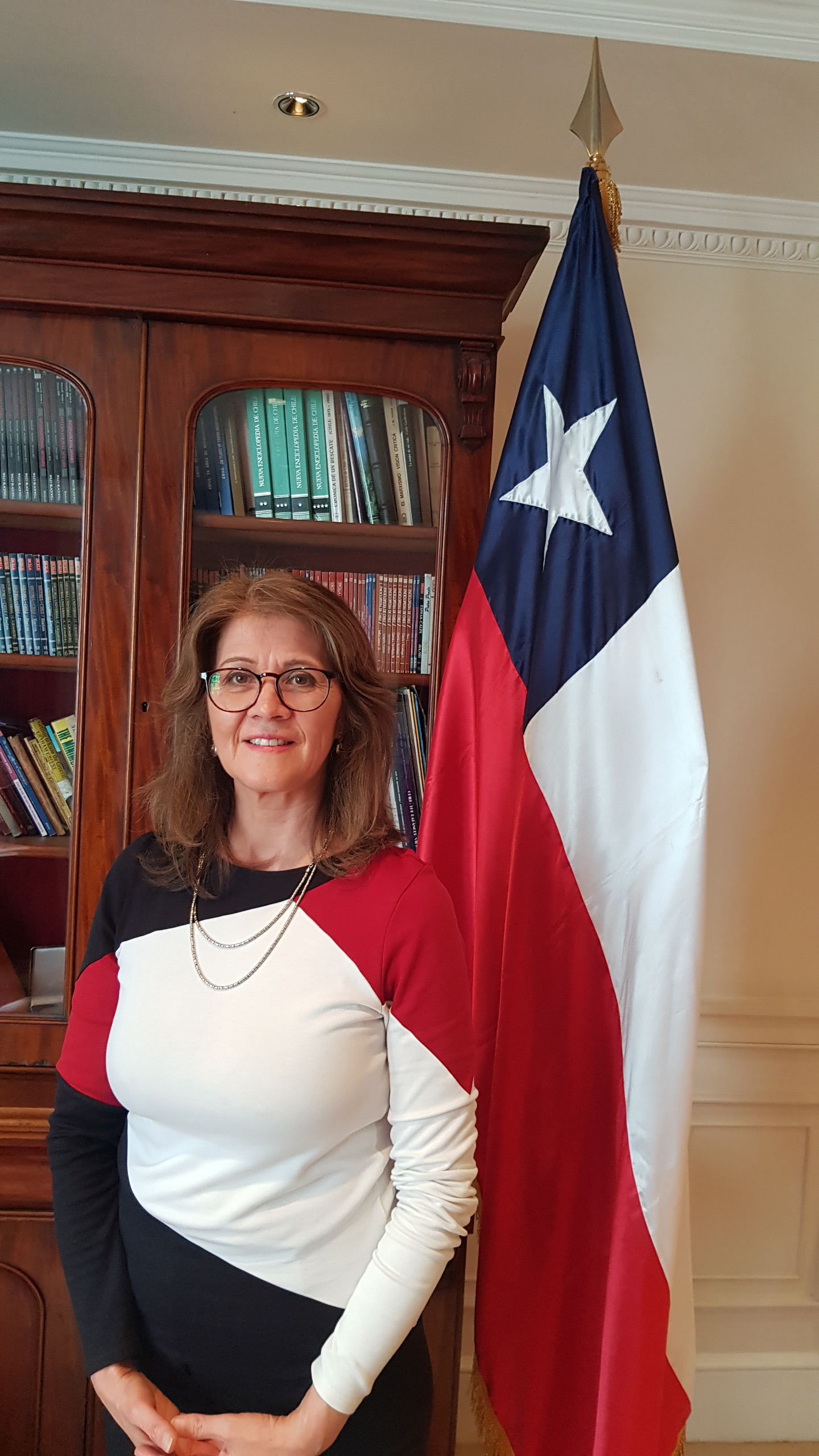Her Excellency
Professor Ximena Fuentes, DPhil, Oxon
Ambassador of Chile

As an undergraduate, Ambassador of Chile Her Excellency Professor Ximena Fuentes participated in the Philip C. Jessup International Law Moot Court Competition, an advocacy contest for law students in Washington DC. “A friend and I presented our oral and written pleadings to address issues of public international law in the context of a hypothetical legal dispute between nations. Being able to exercise my abilities as a future barrister, I realised I would love to do this for a living.”
Pursuing a career in international investment law, and international and environmental law, Ambassador Fuentes went on to spend a year as Deputy Judge of the Second Environmental Tribunal of the Republic of Chile (2012-13). “The environmental tribunals were a new specialised court in Chile, dealing with environmental issues. Our work was essentially overseeing the legality of the acts of the environmental authorities and determining the existence of environmental harm .”
Soon after, Bolivia brought a case against Chile before the International Court of Justice (ICJ). “Although I was happy being a judge, it was a great opportunity for me to be part of the team of international lawyers representing my country, so I went to work for Chile before the ICJ on the case regarding ‘An Obligation to Negotiate Access to the Pacific Ocean’ (2013-18). Before that, I also worked as counsel for Chile in the ‘Maritime Dispute’ with Peru (2008-14). In 2015, I was appointed Head of the International Boundaries Division of the Chilean Ministry of Foreign Affairs and in 2016, I was appointed Agent before the ICJ in the ‘Silala Case’ (Chile v. Bolivia). “This was all good practice for becoming a diplomat.”
Prior to arriving in the UK, the Ambassador held a political appointment as Chile’s Vice Minister of Foreign Affairs (2022-23), a role that had two facets. First, as administrative head of the Ministry of Foreign Affairs, she was the top civil servant within the Ministry. “There were incommensurable levels of work to ensure the ministry was complying with Chile’s administrative law, as well as being responsible for the MFA’s budget.” Second, was her diplomatic role as deputy minister, which involved “co-chairing political consultations with all our partners with whom we have diplomatic relations. Every year or two, we have meetings to review the state of the relationship, to discuss the various treaties on the table, along with the view to the future. I travelled a lot, which was great but sometimes exhausting.”
Arriving in the capital back in May, Ambassador Fuentes is delighted to have returned to Britain, as she completed her PhD here (at Oxford University) in the mid-1990s. “Then I accompanied my husband to complete his PhD at Edinburgh University. We loved living there, met amazing people, and of course, we had the rest of beautiful Scotland on our doorstep.”
The Ambassador has had a busy start to the posting, organising numerous high-level visits to London, from Chile’s ministers of mining, finance, education and environment. She notes “this is a clear demonstration of the priority we give to the UK-Chile relationship. Following Brexit, we were one of the first countries to have a continuity trade agreement. We also have a bilateral investment treaty in force, and Chile was one of the first countries to approve Britain’s accession to the Comprehensive and Progressive Agreement for Trans-Pacific Partnership (CPTPP).”
Her key priorities include “strengthening our business, investment and trade relationships with Britain. Chile is a medium-sized country, but we are a Latin American success in many aspects, and we have a lot to offer to our partners. We are a mining country, and are the first producer of copper, and have the largest lithium reserves in the world. British companies have been operating in Chile since the nineteenth century, but today, I think we can also cooperate in energy transition, as we have been fast in moving towards green energy.”

"We want our partners to understand that Chile views itself as an active contributor to building a better world, and my job here in the UK is to pass on that message so that we could have more interaction with Britain."
She continues: “Climate change is one of the greatest challenges of our times, together with the loss of biodiversity and pollution. In this context, Chile has enormous potential to contribute to the global reduction of GHG emissions. She continues: “I know that Britain has resources of its own for green hydrogen, but we could cooperate on the development of green hydrogen technology. We are also looking to Britain with regards to wind power, as Chile has comparative advantages in this field and there are opportunities for British companies to invest.
“These areas could be a fantastic opportunity for our scientists, academics and for business, and help us in building a better society for all. We lived through a terrible dictatorship for 17 years, but we have had stable democratic governments since 1990. We want our partners to understand that Chile views itself as an active contributor to building a better world, and my job here in the UK is to pass on that message so that we could have more interaction with Britain.”
She continues that Chile is an active participant on the triple crisis agenda: climate change, biodiversity and pollution. “We have been leaders in putting these topics on the table for negotiations, and we have good diplomats and scientists in this area.” Furthermore, she is proud that Chile’s Minister of Environment, Maisa Rojas, is a well-known female scientist of climate change and has been a member of the intergovernmental panel on climate change (IPCC).
The Ambassador notes that Chile is pursuing more visibility in the international arena. Her country recently started a campaign to host the secretariat of the Conservation of Biodiversity Beyond National Jurisdiction (BBNJ) treaty. “We want the secretariat in our country – this would signal clear leadership on this issue. While many international institutions are in Europe, to have the secretariat of such an important institution in Latin America would demonstrate that there is worldwide commitment to the protection of the environment.”
Alongside her political endeavours, Ambassador Fuentes’s academic career has been flourishing. She’s an Associate Professor of Public International Law at the Faculty of Law of the University of Chile and former President of the Chilean Society of International Law. She admits her vocation means she doesn’t have much time to indulge in any hobbies. But she’s passionate about reading and writing and has enjoyed getting to know various Chilean writers, including the Booker Prize nominated Benjamin Labatut, along with Alia Trabucco Zerán, winner of the 2024 Eccles Centre and Hay Festival Writer's Award, to name a few.
The Ambassador comes to London with one of her three children (all in their 20s); her husband is a law professor and politician who travels back and forth between the two countries.
Essentially, Ambassador Fuentes believes that Chileans have many similarities with the British, “in terms of how we look at the world and our sense of humour. We both have an islander mentality. Although Chile is part of a continent, we are somehow geographically separated from the rest of the American continent by the Andes mountains on the east, the Atacama Desert on the north, the Pacific Ocean on the west, and to the south the nearest place is Antarctica. These conditions mean Chileans have an adventurous spirit, like the British. So, we have lot of things in common!” Furthermore, she notes, “Britain is also one of the preferred destinations of our post-graduate students. They love Britain, and these academic exchanges are flourishing. I think Chile is an interesting prospect for Britain, and my job is to put all these topics on the table.”
